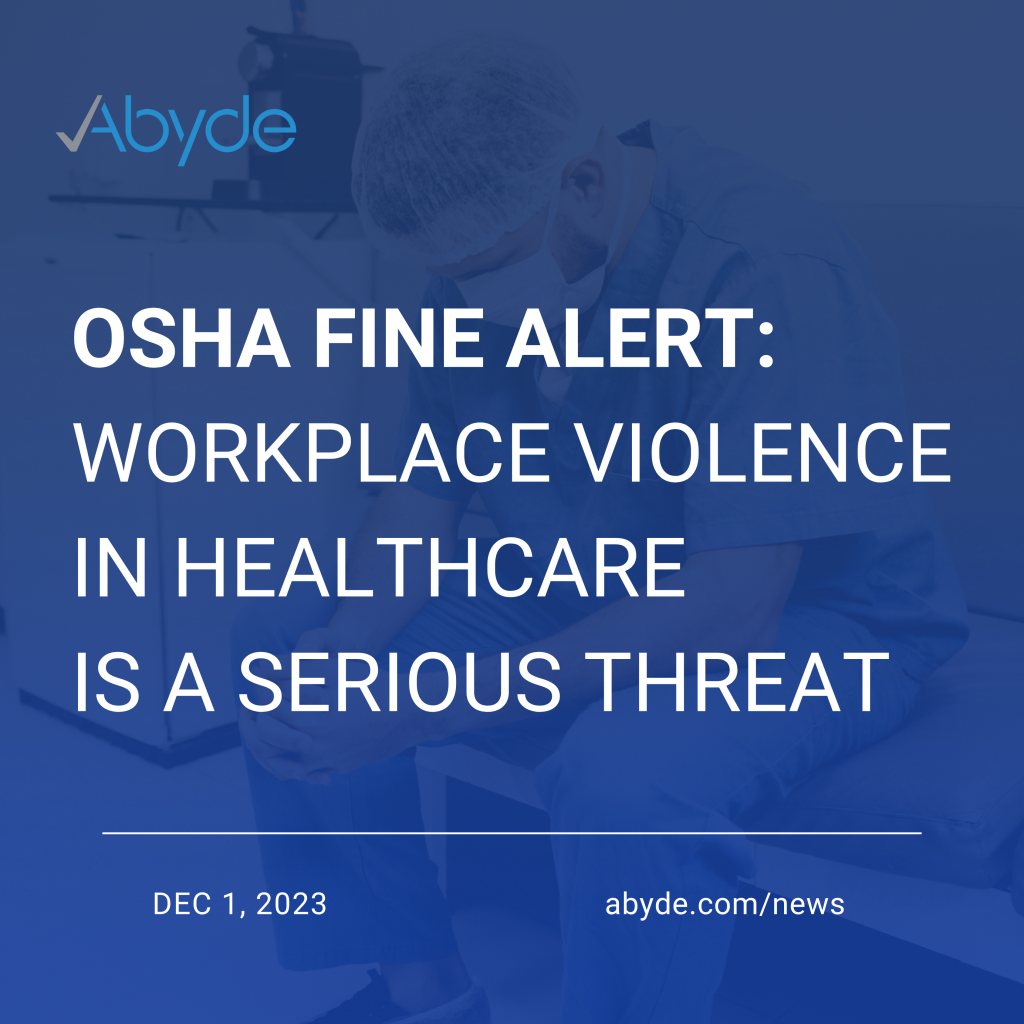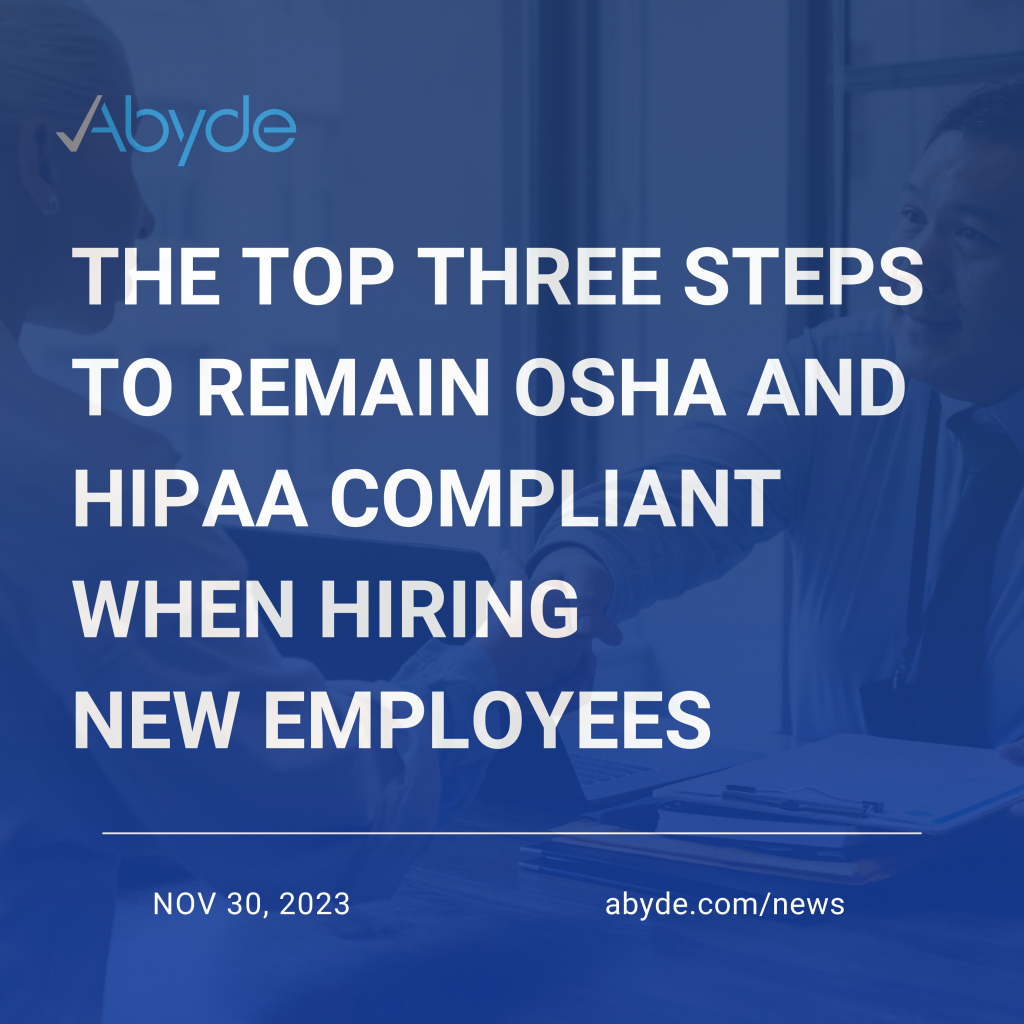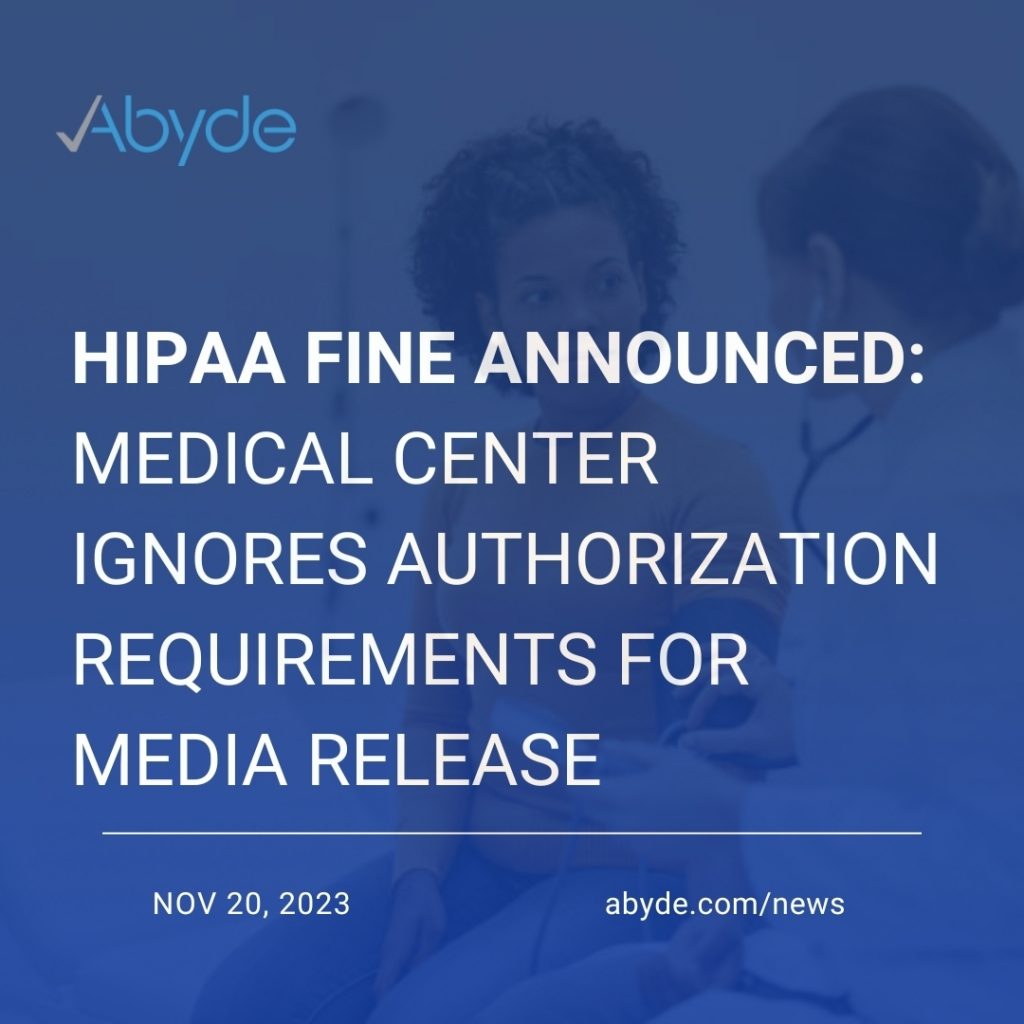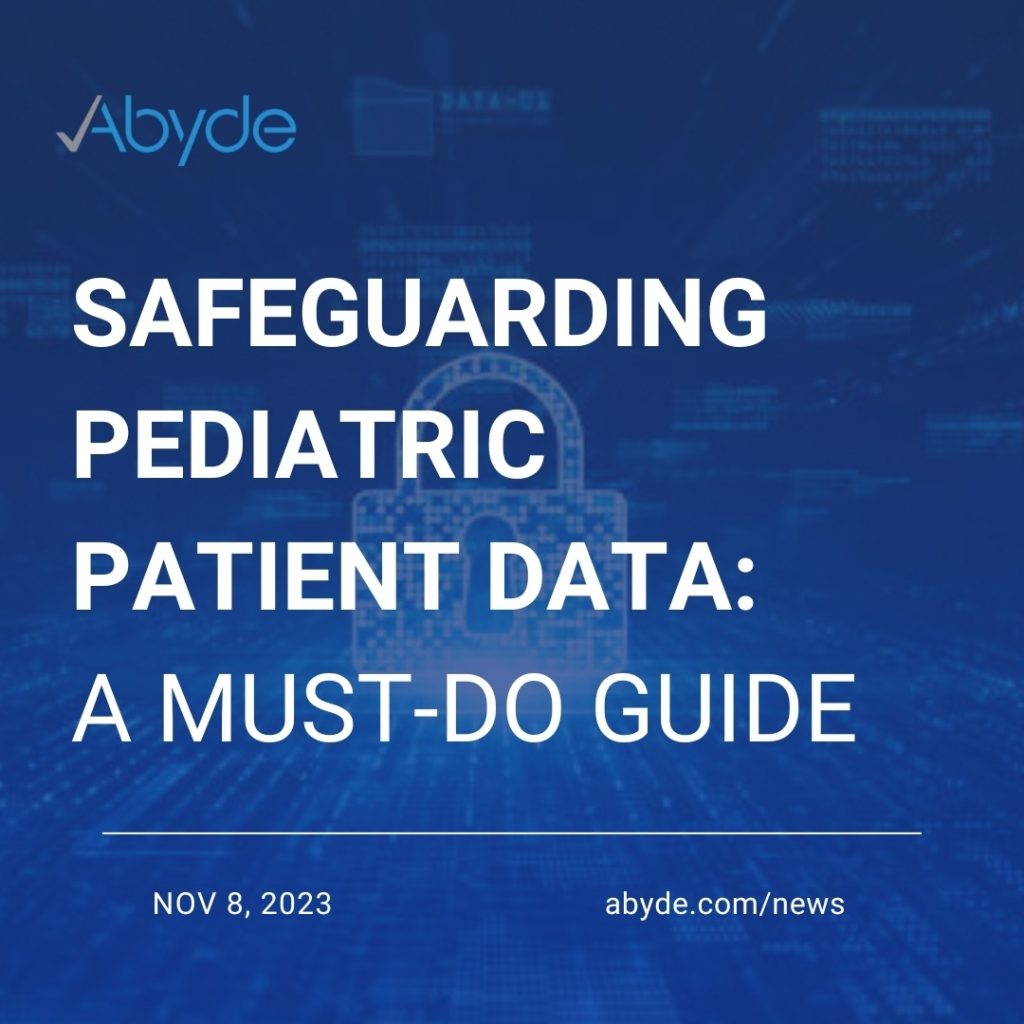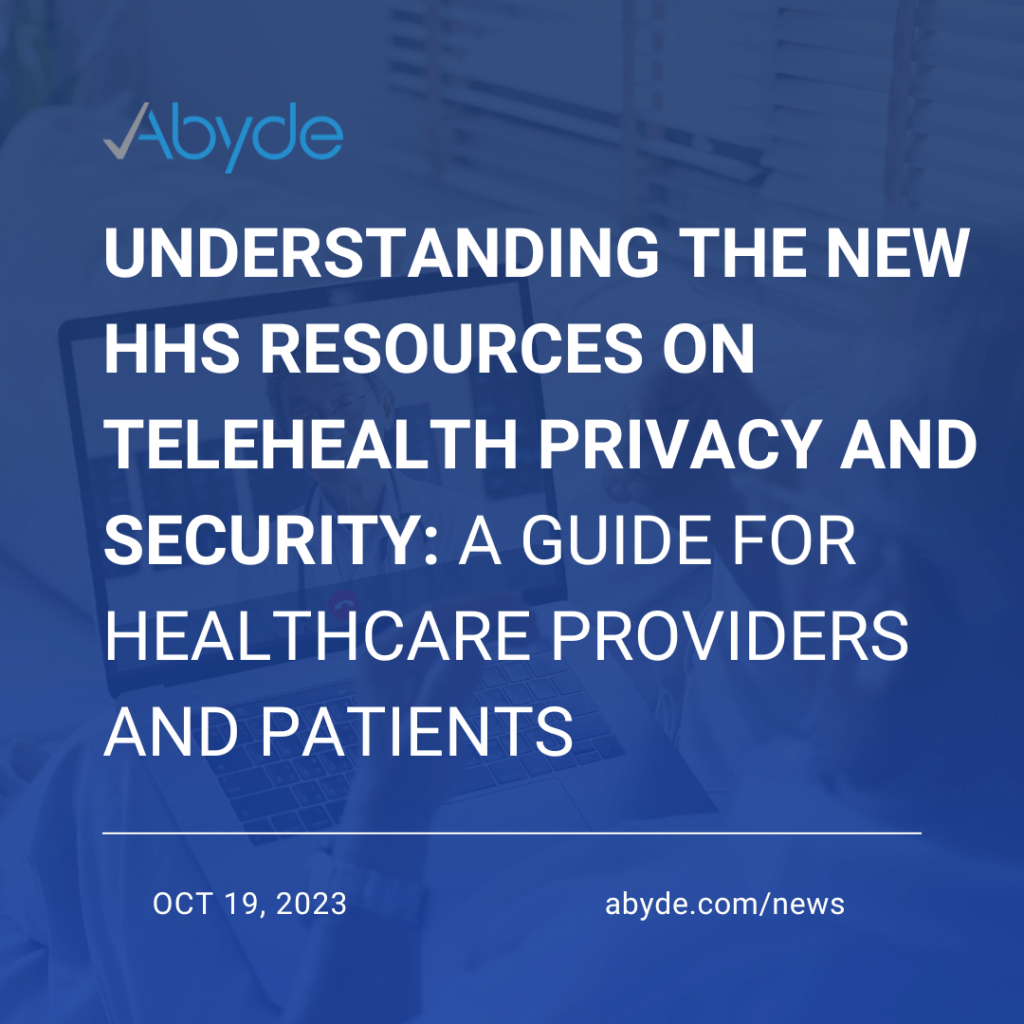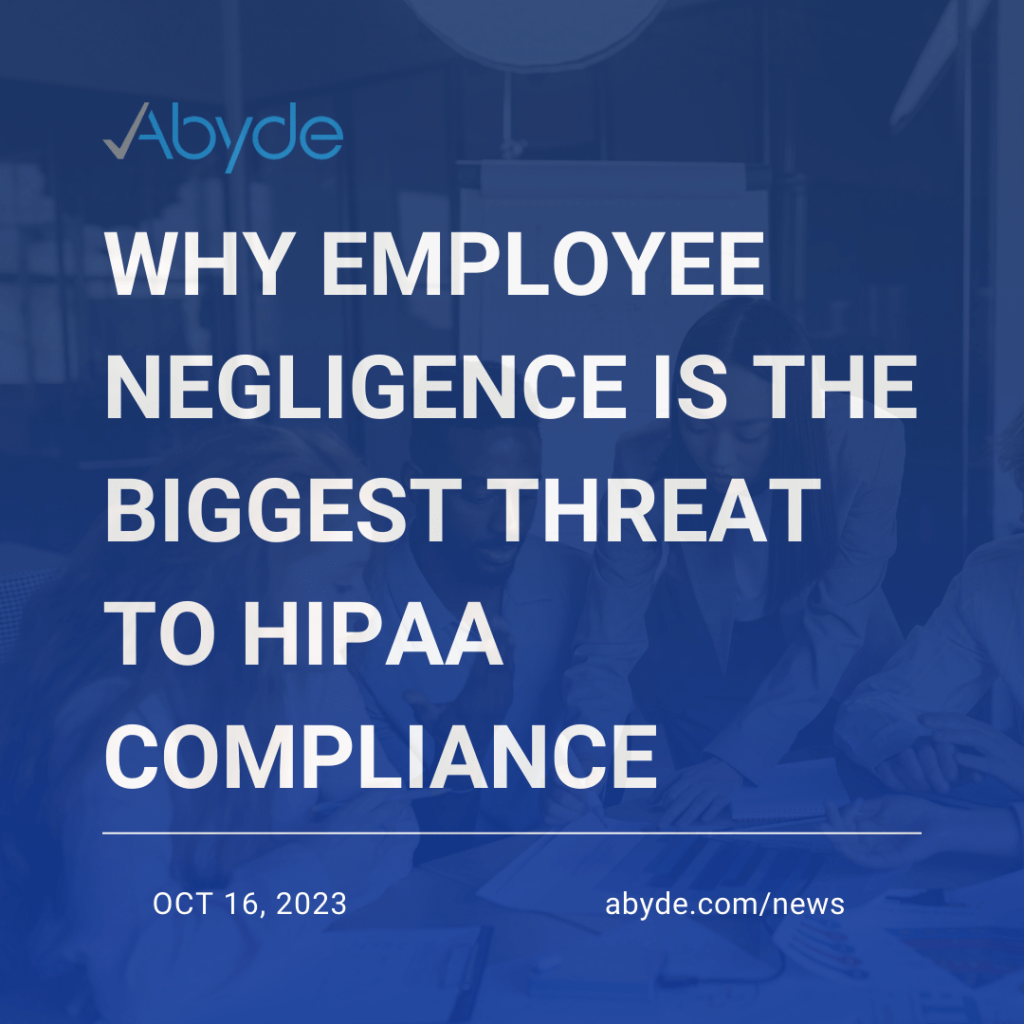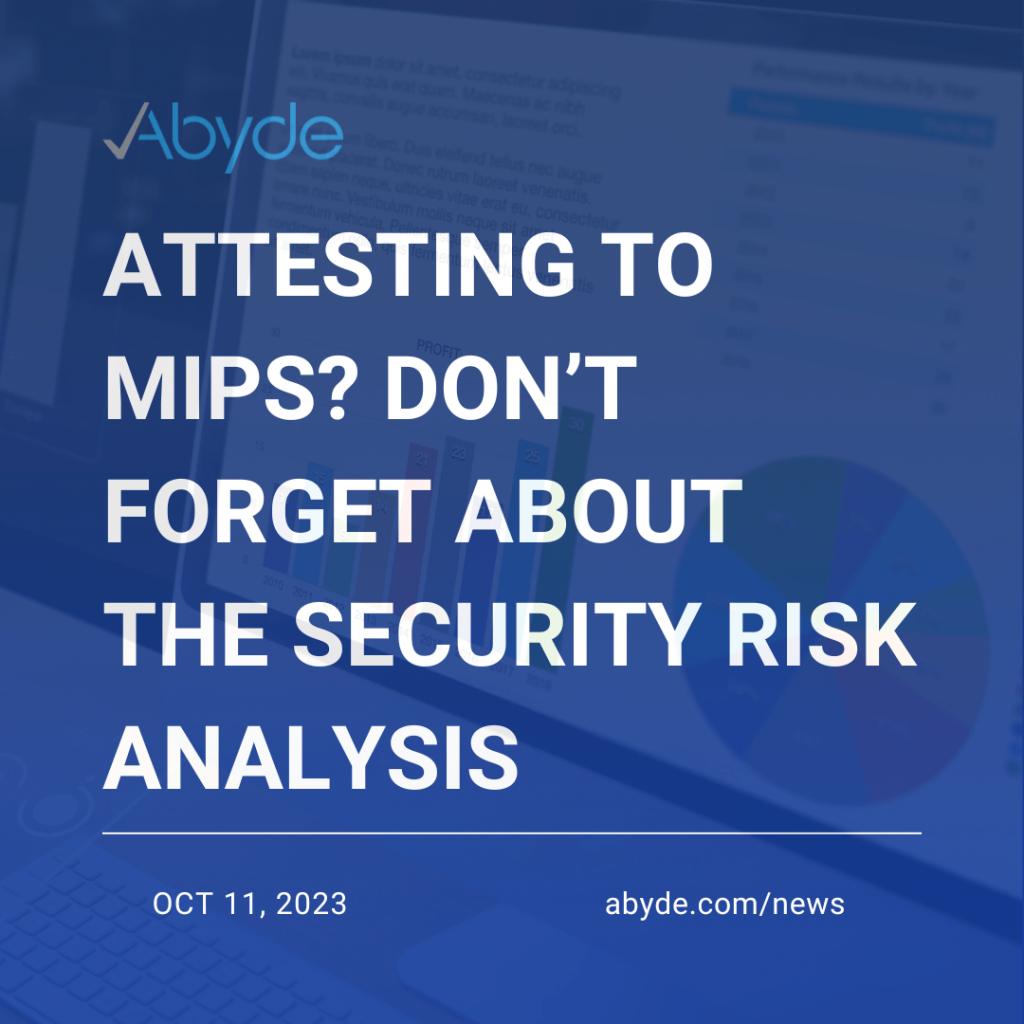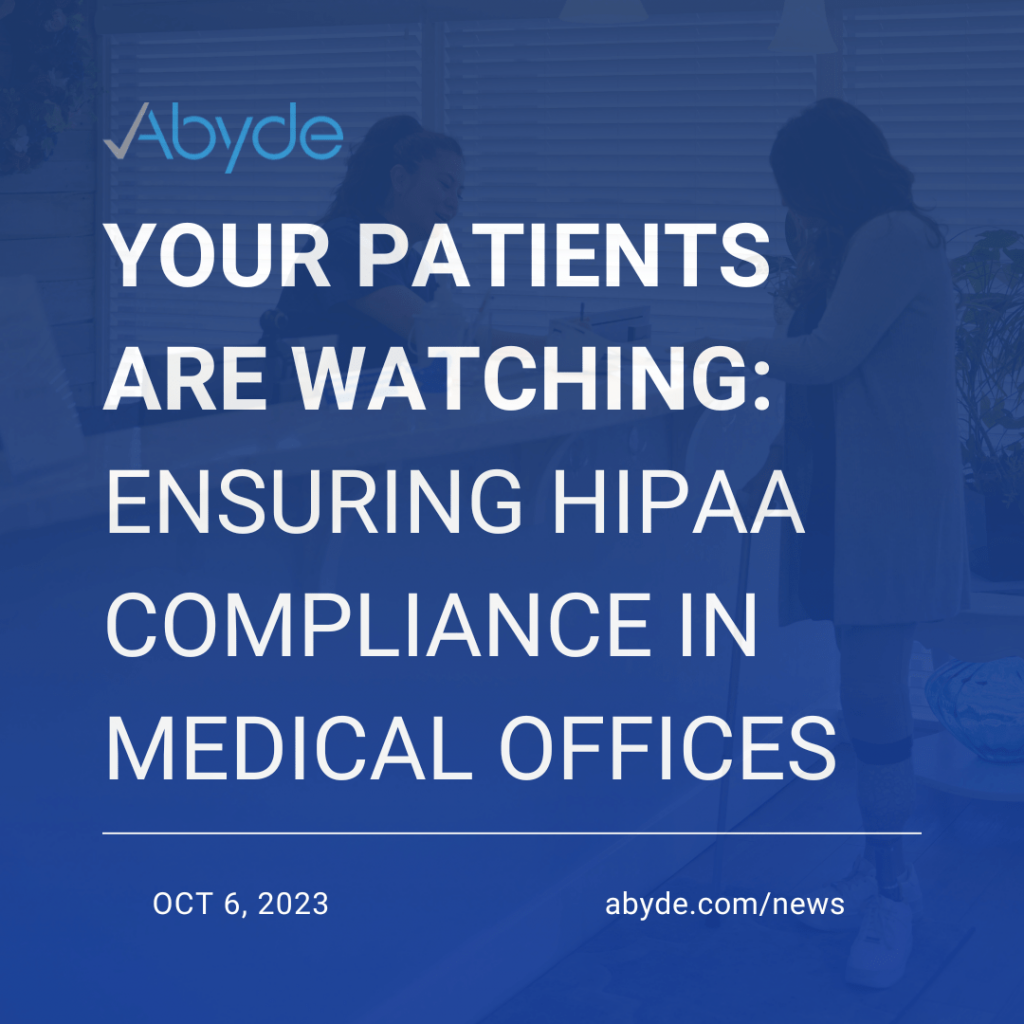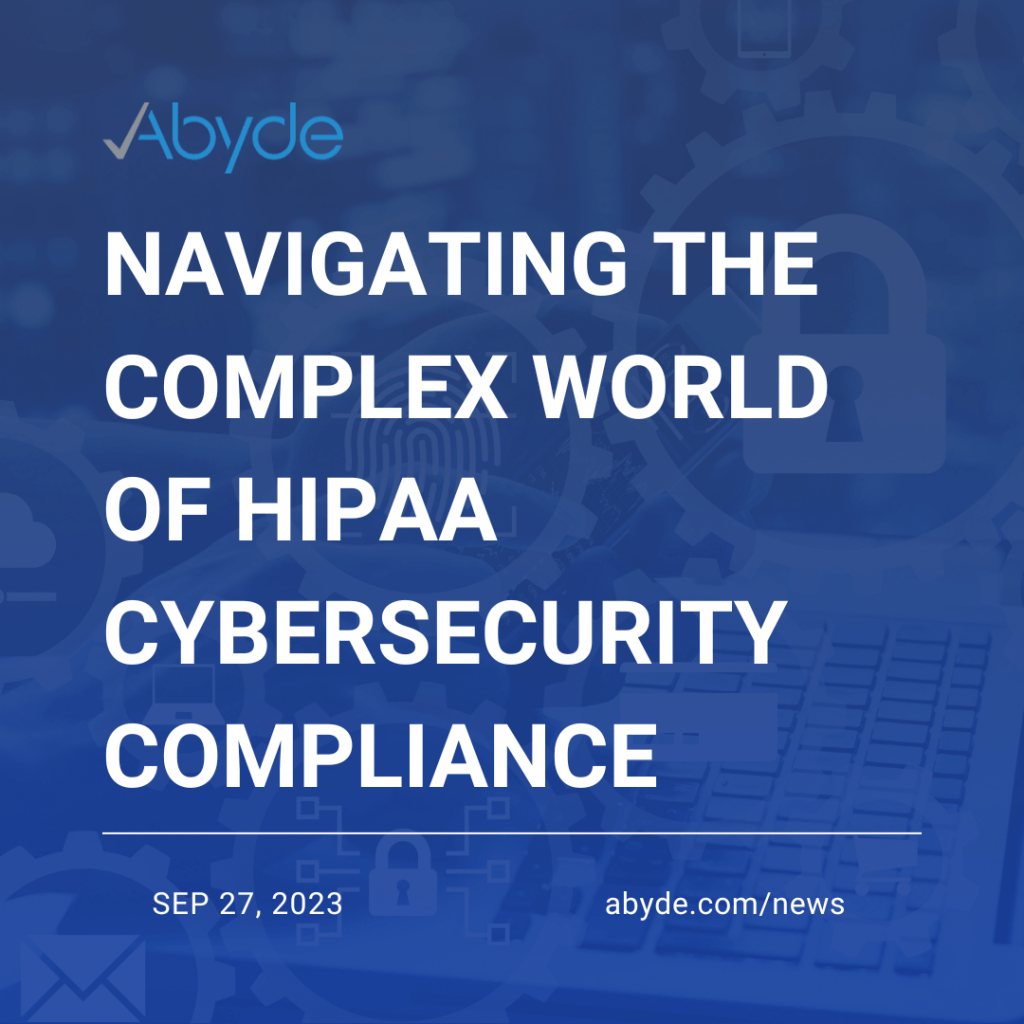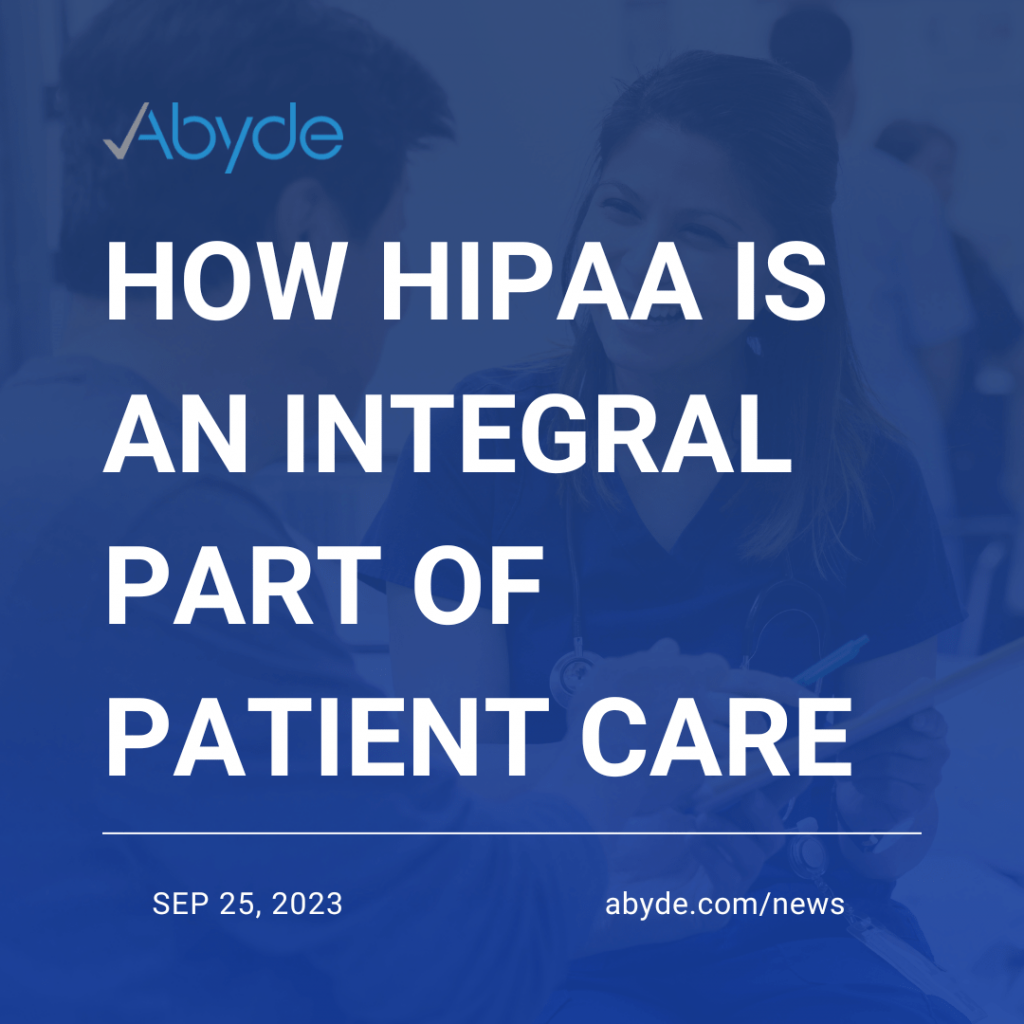December 1, 2023 The recent OSHA investigation of a South Bay correctional facility highlights the ongoing problem of workplace violence in healthcare settings. The facility failed to implement proper safety protocols, resulting in a violent attack on a nurse by an inmate. This incident underscores the critical need for healthcare employers to prioritize worker safety and comply with OSHA regulations. Key Takeaways from the South Bay Incident: Abyde: Your Partner in Healthcare Compliance Abyde understands the unique challenges of healthcare organizations in ensuring worker safety and compliance. We offer a comprehensive suite of solutions to help: Protect Your Workers and Avoid Legal Ramifications Failing to prioritize workplace safety can have serious consequences for healthcare organizations, including legal action, fines, and reputational damage. By partnering with Abyde, you can proactively comply with regulations and create a safer environment for your staff. Click here to learn more about Abyde’s solutions for healthcare compliance and worker safety. Additional Resources:
The Top Three Steps to Remain OSHA and HIPAA Compliant when Hiring New Employees
November 30, 2023 In the fast-paced realm of healthcare, where patient confidentiality and workplace safety are paramount, hiring new staff demands meticulous attention to HIPAA and OSHA compliance. From the moment a new employee steps through the door, it’s crucial to instill a culture of compliance. Here’s a breakdown of the top three steps a medical practice should take during the onboarding process to ensure their team members are well-versed in compliance. 1. Training: The Foundation of Compliance Training is the bedrock of a compliant workforce. Before the employee even starts to perform job duties, invest time and resources in comprehensive training sessions that focus on both HIPAA and OSHA regulations. Abyde’s employee training portal can guide the creation of tailored training materials, ensuring that employees receive relevant, up-to-date information. Ensure that the training covers the nuances of patient privacy, proper handling of medical records, and the essential safety protocols mandated by OSHA. This also includes making sure employees who work with specialized equipment like X-ray machines, MRIs and lasers are trained specifically on each device. Regular updates and refresher courses can be facilitated through Abyde’s user-friendly employee portal, maintaining a continuous learning environment. 2. Confidentiality Agreements: Protecting Patient Privacy Securing patient information is at the core of HIPAA compliance. Implementing confidentiality agreements is a vital step in ensuring that new hires understand the gravity of safeguarding sensitive data. Clearly outline expectations regarding the handling of patient records, communication protocols, and consequences for breaches. Abyde can assist in streamlining this process by providing dynamically generated confidentiality agreements. Once signed, these agreements should be securely stored and easily accessible for future reference, ensuring that both parties are held accountable. 3. Access to Policies and Procedures: Empowering Informed Decision-Making Granting new employees easy access to your organization’s policies and procedures is essential for fostering informed decision-making. Abyde’s platform facilitates seamless accessibility, allowing employees to review and familiarize themselves with compliance guidelines at their own pace. This access is not only crucial during the onboarding process but should be an ongoing resource. Regular updates to policies and procedures can be effortlessly communicated through Abyde’s platform, ensuring that your team remains aligned with the latest compliance standards. In conclusion, successfully onboarding a new employee in a medical practice requires a strategic approach to compliance. By prioritizing training, confidentiality agreements, and access to policies and procedures, organizations can create a robust foundation for a compliant and secure workplace. Abyde’s innovative solutions streamline these processes, empowering medical practices to navigate the complexities of HIPAA and OSHA compliance with confidence.Interested in seeing the Abyde solution in action? Click here to schedule a demo or call us at 1800-594-0883.
HIPAA Fine Announced: Medical Center Ignores Authorization Requirements for Media Release
November 20, 2023 In recent news, the U.S. Department of Health and Human Services (HHS), Office for Civil Rights (OCR) settled a HIPAA investigation with Saint Joseph’s Medical Center over the unauthorized disclosure of COVID-19 patients’ protected health information (ePHI) to a national media outlet. This incident underscores a critical lesson in patient privacy, prompting Abyde to emphasize the significance of obtaining patient authorization before releasing any ePHI or images. See, What Had Happened Was Saint Joseph’s Medical Center, a non-profit academic medical center in New York, faced potential violations of the Health Insurance Portability and Accountability Act of 1996 (HIPAA) Privacy Rule. The center improperly disclosed sensitive patient information to a national media outlet without obtaining the necessary written authorization from the patients, leading to a settlement with the OCR. The Importance of Patient Authorization The OCR makes it clear that patients have the right to control the disclosure of their health information. This settlement highlights the need for healthcare providers to prioritize patient authorization before releasing any ePHI or images, particularly to the media. Abyde’s Take When undergoing medical treatment in medical facilities, patients should feel assured that their healthcare providers will not disclose their personal health information to the media without obtaining proper authorization. Abyde cannot stress enough the responsibility of healthcare providers in safeguarding patient privacy. Key Takeaways: Our Final Word The settlement with Saint Joseph’s Medical Center serves as a valuable lesson for healthcare providers everywhere. Abyde remains committed to supporting practices in navigating the complexities of HIPAA compliance, with a specific emphasis on the importance of obtaining patient authorization before disclosing any ePHI or images. To see why Abyde is considered the pre-eminent HIPAA compliance solution, click here to schedule a demo.
Safeguarding Pediatric Patient Data: A Must-Do Guide
November 8, 2023 Imagine a bustling pediatric practice, filled with the laughter of kids. In this lively setting, protecting patient data may not be the first thing on your mind, but it’s as important as ensuring those precious smiles! At Abyde, we’re all about ensuring the well-being of your little patients, and that begins with safeguarding their data. Let’s explore why this is crucial and how compliance and security play a vital role in keeping patient information safe. Why is Pediatric Patient Data So Important? The health records of children are a treasure trove of essential information, from vaccination records to allergies and growth charts. But medical data isn’t the only data that’s valuable – you’re also talking names, dates of birth, addresses and potentially social security numbers. Securing this data is vital to guarantee a healthy future for your young patients. The Compliance Connection So, what’s compliance? Think of it as your guide to data security. Compliance means adhering to rules and regulations, ensuring patient data remains secure. HIPAA (Health Insurance Portability and Accountability Act) is one of these essential rules, setting the standards for protecting sensitive health information. The Role of Security Security acts as the guardian of patient data. It encompasses measures like secure passwords, firewalls, and encryption, shielding data against breaches and unauthorized access. However, there’s a crucial component: proper documentation. Without it, your security measures are like having a shield but no strategy. Documented policies and procedures are your roadmap for keeping data safe, outlining how data is accessed, stored, and shared. It’s More Than Just Locks and Keys Data security isn’t just about digital locks; it’s also about your staff’s training to protect this treasure. Training ensures that they handle patient data responsibly, whether it’s on paper or in a computer. Equally important is your ability to prove that you’re doing everything right. Regular audits and monitoring help you ensure that your data is well-protected. In Conclusion The secret to protecting pediatric patient data involves a blend of compliance, security, documented policies, and well-trained staff. When you get this recipe right, you become a healthcare hero in the pediatric world. Remember, every effort you invest in safeguarding patient data ensures more smiles on those adorable faces. And there’s no better way to implement and sustain mandatory compliance programs than with Abyde—the industry’s easiest and most comprehensive software. With Abyde, you’ll effortlessly manage your compliance needs and keep those little smiles sparkling and secure!
Understanding the New HHS Resources on Telehealth Privacy and Security: A Guide for Healthcare Providers and Patients
October 20, 2023 The telehealth usage surge has revolutionized healthcare delivery, particularly amid the COVID-19 pandemic. While the technology offers numerous benefits, it also raises questions about the privacy and security of Protected Health Information (PHI). Addressing this, the U.S. Department of Health and Human Services’ Office for Civil Rights (OCR) recently released two essential resources to educate healthcare providers and patients. In this article, we delve into the key takeaways from these resources and discuss their implications for HIPAA compliance. What Has Been Released? OCR has issued two resource documents: For Healthcare Providers Although HIPAA doesn’t mandate healthcare providers to educate patients about the risks involved in telehealth, the new resource provides valuable guidelines for those who choose to do so. Topics covered include: For Patients Patients are provided with recommendations to protect and secure their health information, such as: Why Is This Important? “Telehealth is a wonderful tool that can increase patients’ access to health care and improve health care outcomes,” says OCR Director Melanie Fontes Rainer. By educating patients and providers about privacy and security risks, OCR aims to build confidence and encourage the responsible use of telehealth technologies. Practical Tips for Health Care Providers Recommendations for Patients Final Thoughts The newly released resources by OCR offer a comprehensive guideline for navigating telehealth’s privacy and security aspects. Healthcare providers should seize this opportunity to improve their practices and educate their patients, enhancing the telehealth experience. For more information on how to stay compliant with HIPAA and other regulations in the healthcare sector, feel free to contact Abyde, your trusted partner in HIPAA and OSHA Compliance.
Why Employee Negligence is the Biggest Threat to HIPAA Compliance
October 16, 2023 Welcome to another edition of Abyde’s insights into the complex world of healthcare compliance. As HIPAA and OSHA compliance experts, we understand the numerous challenges healthcare providers face. Today, we’ll delve into a topic that doesn’t receive as much attention as it should: the role of employee negligence in undermining HIPAA compliance. While advanced cybersecurity measures and secure data storage are essential, human error remains the most significant threat to your organization’s HIPAA compliance. The Human Factor Employees are your front-line defense against breaches and violations. Whether it’s mishandling patient records, failing to encrypt sensitive data correctly, or clicking on phishing emails, the human element poses a unique set of challenges. According to a report by Cybersecurity Insiders, over 60% of organizations identify employee negligence as the most significant risk factor. Common Types of Negligence Inadequate Training Lack of proper training on HIPAA regulations and protocols is often the root cause of negligence. A well-trained workforce is crucial to minimizing errors. Poor Password Management Employees often use weak passwords or reuse passwords across platforms. The implementation of strong password protocols can prevent unauthorized access. Sharing Information One of the most common types of employee negligence is sharing sensitive patient data, whether intentionally or unintentionally. The HIPAA Privacy Rule clearly outlines the guidelines for sharing Protected Health Information (PHI). Consequences of Negligence Financial Penalties Failing to comply with HIPAA can result in hefty fines, ranging from $100 to $50,000 per violation, according to the U.S. Department of Health & Human Services. Legal Repercussions Depending on the severity of the violation, legal action may be taken against the healthcare provider, leading to a damaged reputation and loss of trust. Data Breaches Negligence can lead to data breaches that may require public disclosure, further eroding patient trust and damaging your reputation. Mitigating the Risk Comprehensive Training Programs Regular and rigorous training can significantly reduce instances of employee negligence. Abyde’s HIPAA training solutions can offer a robust program designed to keep your staff informed and compliant. Technology Solutions Leverage technology to minimize the impact of human error. Software solutions like Abyde can provide real-time monitoring and alerts for any compliance issues. Regular Audits Frequent internal audits can identify potential areas of concern before they become major issues. For more on how to perform these audits, check out our resources section here. Final Thought While external threats are a concern, the biggest threat to HIPAA compliance often comes from within. By focusing on comprehensive training and leveraging technology, you can mitigate the risks posed by employee negligence. Trust Abyde to provide you with the tools and expertise to ensure that your organization remains compliant and secure. Contact us today for more information on how Abyde can assist with your HIPAA compliance needs.
Attesting to MIPS? Don’t forget about the Security Risk Analysis
October 11, 2023 It’s your practice’s responsibility to get the SRA done, not your EHR The Merit-Based Incentive Payment System (MIPS) is a Medicare program that rewards eligible clinicians and groups for providing high-quality, cost-effective care. MIPS is a value-based payment program, which means that it ties payments to performance on quality measures, promoting interoperability, improvement activities, and cost. Eye care practices are eligible to participate in MIPS, and they can earn financial incentives for performing well on the program’s measures. One of the most important measures in MIPS is the Security Risk Analysis (SRA). The SRA is a process that helps eye care practices identify and mitigate security risks to their patients’ protected health information (PHI). The SRA must be conducted annually, and MIPS-eligible clinicians must attest to completing an SRA in order to receive a score for the Promoting Interoperability performance category. There are many reasons why SRAs are important for eye care practices. First, SRAs help practices comply with the Health Insurance Portability and Accountability Act (HIPAA), which requires covered entities to protect the privacy and security of PHI. Second, SRAs can help practices avoid costly and damaging data breaches. Data breaches can have a significant financial impact on eye care practices. In addition to the direct costs of responding to a breach, practices may also face lost revenue, reputational damage, and liability lawsuits. SRAs can help eye care practices to avoid data breaches by identifying and addressing security risks. The SRA process involves assessing the practice’s physical, technical, and administrative safeguards and implementing corrective actions to address any identified deficiencies. In addition to helping practices comply with HIPAA and avoid data breaches, SRAs can also help practices improve their overall security posture. By regularly conducting SRAs, practices can identify and address new security threats as they emerge. Eye care practices can conduct SRAs on their own, or they can hire a qualified third party to assist them. There are many resources available to help practices conduct SRAs, including the CMS website, the HIPAA Security Rule website, and the ONC website. Here are some tips for eye care practices conducting SRAs: By conducting regular SRAs, eye care practices can protect their patients’ PHI, avoid costly data breaches, and improve their overall security posture. Need help or have questions? Click here to schedule a complimentary compliance consultation with an expert today!
Your Patients Are Watching: Ensuring HIPAA Compliance in Medical Offices
October 6, 2023 The Health Insurance Portability and Accountability Act (HIPAA) is not just a set of guidelines that medical practices must follow to avoid fines and penalties; it’s a standard for patient care. Patients are well-informed about the importance of data privacy and security in an increasingly digital world. They are vigilant and observant, carefully watching how medical offices manage their confidential information. Hence, maintaining HIPAA compliance is a regulatory necessity and a way to gain patient trust and satisfaction. Below are some tips and tricks to ensure you stay HIPAA compliant when patients are watching. Signs Your Patients Are Monitoring HIPAA Compliance Tips and Tricks for Ensuring HIPAA Compliance Clear Communication with Patients Train Your Staff Physical Environment Tech-Savvy Measures Documentation Patient Feedback HIPAA compliance is a shared responsibility between healthcare providers and their staff. When your patients see you taking steps to protect their privacy and uphold the law, it builds trust, which is priceless in healthcare. Keeping an eye on these elements will help you stay compliant and make your patients feel secure and respected. How Abyde Can Help Risk Analysis Abyde provides a thorough Risk Analysis that helps identify potential vulnerabilities in your healthcare practice. The software can pinpoint where compliance might fall short and recommend specific actions to remedy these issues. Staff Training Abyde offers built-in staff training modules aimed at making your team HIPAA-savvy. Your staff must know the ins and outs of HIPAA, and training them with Abyde ensures you’re covering all your bases. Real-time Monitoring One of the critical features of Abyde is its real-time monitoring capabilities. It can automatically track activities that may be non-compliant and send alerts so that corrective action can be taken immediately. Documentation and Reporting Compliance is also about being able to prove that you’re compliant. Abyde’s robust reporting capabilities offer comprehensive documentation that can be invaluable during audits or legal scrutiny. Automated Audits Regular audits are a must, and Abyde offers automated solutions for this. It can conduct regular audits without human intervention, saving you time and effort while ensuring compliance is always up to par. Tailored Solutions Every healthcare practice is unique, and Abyde understands this. Its software solutions can be tailored to meet the specific needs of your practice, making compliance more manageable and effective. Additional Resources for HIPAA Compliance Staying HIPAA compliant is not just a legal obligation but a promise of trust and quality that you make to your patients. Abyde can facilitate this process, ensuring you maintain the highest data privacy and security standards. By adhering to HIPAA regulations effectively with Abyde, you not only avoid penalties but also win the trust and loyalty of your patients.
Navigating the Complex World of HIPAA Cybersecurity Compliance
September 27, 2023 Healthcare organizations handle a tremendous amount of sensitive data, from patient records to financial information. The Health Insurance Portability and Accountability Act (HIPAA) serves as the regulatory framework that outlines the need for stringent cybersecurity protocols to safeguard this data. Compliance with HIPAA isn’t just a legal obligation; it’s also a critical aspect of building trust with patients and stakeholders. This article will dive deep into the facets of HIPAA cybersecurity compliance, offering a comprehensive guide for healthcare organizations seeking to align with these standards. What is HIPAA? Enacted in 1996, the Health Insurance Portability and Accountability Act (HIPAA) aims to streamline healthcare transactions, reduce healthcare fraud and abuse, and ensure patient information remains confidential. Over time, HIPAA has evolved to address the modern complexities of digital healthcare data, most notably through the Privacy and Security Rules. HIPAA Security Rule The Security Rule outlines the guidelines that healthcare organizations must follow to ensure the confidentiality, integrity, and availability of electronic protected health information (ePHI). It is broken down into three main categories: Importance of Cybersecurity in HIPAA Compliance Cybersecurity in healthcare is not just about preventing unauthorized access; it’s about building a layered defense mechanism that addresses vulnerabilities across various entry points. Failing to comply can result in hefty fines, legal repercussions, and loss of reputation. Core Principles for Compliance Risk Analysis and Management HIPAA requires healthcare entities to conduct periodic risk analyses to identify potential vulnerabilities. Effective risk management plans should include a multi-layered security approach, such as the use of firewalls, antivirus programs, and encryption protocols. Abyde: Your HIPAA Compliance Partner Navigating the intricacies of HIPAA compliance can be daunting. That’s where Abyde comes in. As a leading HIPAA and OSHA Compliance SAAS Company, Abyde offers HIPAA-compliant software designed to simplify compliance, enabling healthcare organizations to focus on what they do best—providing quality care. With features like automated risk assessments, staff training modules, and continuous compliance monitoring, Abyde is the go-to solution for any organization seeking to secure its electronic healthcare data while adhering to regulatory standards. Employee Training Employees often serve as the first line of defense against cyberattacks. Organizations should provide regular training on recognizing phishing emails, using strong passwords, and securing mobile devices with ePHI access. Access Control Under HIPAA guidelines, only authorized individuals should have access to ePHI. This requires stringent access controls, including unique user identifications, emergency access procedures, and regular audits. Data Encryption Encrypting data in transit and at rest is crucial for protecting sensitive information. While HIPAA does not mandate encryption, it is considered a standard practice in safeguarding ePHI. Incident Response In case of a data breach or unauthorized access, healthcare organizations must have an incident response plan that outlines the steps for reporting the breach, identifying the scope, and taking corrective actions. Tools and Technologies Compliance Monitoring and Audits Maintaining continuous compliance requires ongoing monitoring. Regular internal and external audits can help identify areas of improvement and validate that existing safeguards are adequate. Conclusion HIPAA cybersecurity compliance is a complex but indispensable aspect of healthcare management. By understanding the intricacies of the HIPAA Security Rule and implementing a robust cybersecurity framework, healthcare organizations can protect sensitive data, avoid penalties, and, most importantly, earn the trust of their patients and stakeholders. Given the evolving nature of cybersecurity threats, compliance is not a one-time endeavor but an ongoing commitment. Organizations should always stay updated with the latest HIPAA amendments and cybersecurity best practices to ensure that they remain compliant and secure. Recommended Resources By keeping up-to-date with compliance requirements and embracing a culture of continuous improvement, healthcare organizations can confidently navigate the complicated landscape of HIPAA cybersecurity compliance. Contact Abyde today for a complimentary risk assessment consultation by clicking HERE.
How HIPAA is an Integral Part of Patient Care
September 25, 2023 When discussing the U.S. healthcare system, terms like Electronic Health Records (EHR), patient satisfaction, and telehealth often come to mind. Yet, one aspect that serves as the cornerstone of patient care but only sometimes receives the spotlight it deserves is the Health Insurance Portability and Accountability Act (HIPAA). Established in 1996, HIPAA has been a game-changer in shaping the healthcare landscape, primarily by safeguarding patient information and ensuring health data’s confidentiality, integrity, and availability. This article delves into why HIPAA is not just a legal obligation but an integral part of patient care. The Pillars of HIPAA in Patient Care Privacy and Trust The patient entrusts the provider with their most personal and sensitive information in a healthcare setting. HIPAA ensures that this trust isn’t broken by mandating stringent measures to protect patient data from unauthorized access and disclosure. When patients know their information is safe, they are more likely to share the full extent of their medical history, aiding in more accurate diagnoses and effective treatment plans. Quality of Care When healthcare providers adhere to HIPAA’s security rules, they often employ best practices that go beyond just compliance. For example, accurate and immediate access to patient records allows for a faster and more reliable decision-making process. This directly translates to a higher quality of care, minimizing errors and omissions that could harm patient health. Streamlining Communication HIPAA also lays down the guidelines for the lawful sharing of patient information among different healthcare providers. This proves invaluable in situations where multiple specialists care for a single patient. The seamless and secure exchange of information can speed up the treatment process and ensure that all providers are on the same page, enhancing patient care outcomes. Patient Empowerment One of the lesser-known aspects of HIPAA is that it gives patients the right to access and control how their medical information is used or disclosed. This gives them a more active role in their healthcare journey. Moreover, transferring records securely from one provider to another allows for greater flexibility and choice, making the patient an essential stakeholder in their care. The Technology Angle As healthcare systems continue to adopt more advanced technologies like telehealth services and wearable medical devices, the role of HIPAA becomes even more crucial. These platforms handle massive volumes of sensitive data daily, and HIPAA compliance ensures that technological advancements don’t come at the cost of compromised patient privacy. Conclusion HIPAA isn’t just a set of rules that healthcare organizations must abide by to avoid penalties; it’s a framework that places the patient at the center of healthcare. It helps build trust, assures quality, streamlines communication, empowers patients, and paves the way for technology to serve healthcare needs better. By treating HIPAA compliance as a part of patient care, healthcare providers can foster an environment where both the medical and ethical aspects of care are well-addressed, leading to an improved healthcare experience for all involved. By understanding and embracing the role of HIPAA in patient care, healthcare organizations can go beyond mere compliance to deliver a higher standard of care, which is beneficial for both the patient and the healthcare ecosystem. Contact Abyde today for a complimentary consultation by clicking HERE.
